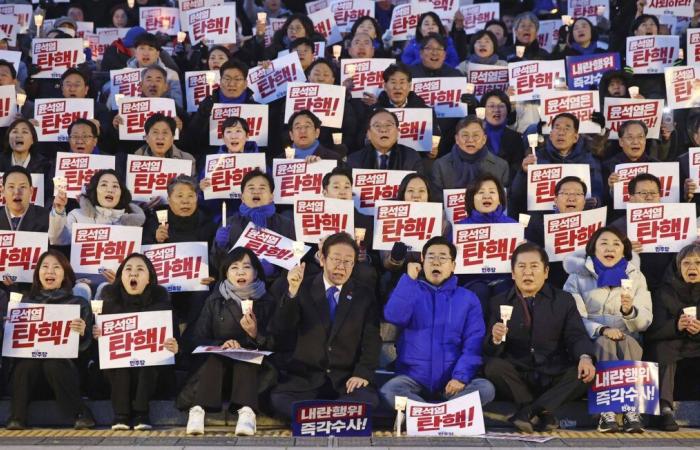Political hangover for South Korea, where martial law was briefly declared overnight from Tuesday to Wednesday. Six South Korean opposition parties accused President Yoon Suk Yeol of having “severely and extensively violated the Constitution” in order to “avoid criminal prosecution” against him, in an impeachment motion filed in Parliament. Haven't you followed the latest events? We summarize it all for you.
What happened Tuesday evening?
On Tuesday evening, at 11 p.m. local time, President Yoon Suk Yeol made a surprise televised address. He announced he was calling for martial law “to protect liberal South Korea from threats posed by North Korean communist forces and eliminate elements hostile to the state.” He was thereby targeting the opposition, the majority in Parliament and with whom discussions around the budget have been very tense for some time. The imposition of martial law involved the suspension of political life, the closure of parliament and the placing under control of the media.
After his announcement, troops were deployed and army helicopters landed on the roof of the South Korean parliament. But 190 deputies out of 300 were able to meet in disaster in the hemicycle where special forces were trying to penetrate. They managed to pass a resolution and obtained the repeal of the measure just hours after its announcement.
Important events
As of Tuesday evening, Koreans gathered in front of Parliament in Seoul to express their disagreement with martial law. The next day, South Korea experienced yet another day of anger and demonstrations. This Wednesday, thousands of people demonstrated in the streets of Seoul to demand the dismissal of Yoon Suk Yeol.
With banners, candles and distributions of hot drinks, Koreans showed that they were deeply shocked to have seen their country so close to turning its back on nearly forty years of democracy. “It was like a history lesson,” said Park Su-hyung, 39, for example. Our democracy will be trampled if we leave Mr. Yoon in power for another moment. » The demonstration which was headed in front of the Presidential Palace dispersed smoothly in the middle of the evening
The president in the hot seat
The future of Mr. Yoon, a former attorney general who became president in 2022, now appears uncertain. The impeachment motion, which will require a two-thirds majority to be adopted, could be put to a vote as early as Friday, indicated the six opposition parties represented in Parliament, including the main one, the Democratic Party (center -LEFT).
The Korean Confederation of Trade Unions, the largest inter-union organization in the country with some 1.2 million members, called for an “indefinite general strike” until the resignation of Yoon Suk Yeol, believing that he had “signed his own end to power.”
Defense Minister Kim Yong-hyun has already announced that he has offered his resignation to the president. “I deeply regret and take full responsibility for the confusion and concern caused to the public by martial law,” he wrote in a statement. Although he was narrowly elected and his popularity rating was already at its lowest, Yoon Suk Yeol has not appeared publicly since the announcement of martial law.






